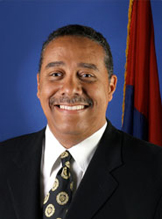Duggan donor database: Big-time, Super PAC money comes to Motown

Unlimited political donations swept into Detroit last year with the emergence of so-called Super PACs, which pumped more than $3.5 million into the 2013 mayoral race between Mike Duggan and Benny Napoleon.
First the province of national and statewide campaigns following ground-shifting 2010 U.S. Supreme Court decisions, Super PACs brought million-dollar donations to Detroit, making it one of the first cities to adopt fundraising on a Super PAC scale.
“It’s still not the norm, but another five or 10 years from now, if national law were to stay the same, one would almost expect it would be de rigeur for Super PACs to be involving themselves in competitive mayoral races across the country,” says David Levinthal, senior political director at the Center for Public Integrity, a nonpartisan national news organization that investigates the role of money in politics.
Bridge, WDET Detroit Public Radio and the Detroit Journalism Cooperative have compiled a database that tracks donors to Duggan’s Super PAC and how much they gave. For those who believe that powerful people and institutions expect something in return for donations, this list also serves a watchdog function, allowing Detroit residents to monitor which, if any, donors may benefit financially from the city while Duggan is in office.
The pro-Duggan Turnaround Detroit fund raised and spent more than $3.1 million, most on ads supportive of Duggan, the former CEO of the Detroit Medical Center.
Duggan’s opponent in last year’s election, Wayne County Sheriff Benny Napoleon, benefited from Detroit Forward, a Super PAC that raised and spent more than $460,000. The pro-Napoleon fund also drew scrutiny because, according to the Free Press, nearly a third of its money, $149,000, came from a group called the Michigan Community Education Fund, a 501(c)4 nonprofit that does not have to disclose its donors.
Neither candidate’s Super PAC was restricted to the state’s $3,400 personal limit and $34,000 PAC limit to candidate committees.
Penske topped Duggan donor list
Automotive magnet Roger Penske gave Turnaround Detroit $500,000, records show. His company, Penske Corp., also gave $500,000. Seven other people or organizations gave Turnaround Detroit $100,000 or more, including DTE Energy, Compuware cofounder Peter Karmanos Jr., PVS Chemicals and the Detroit Regional Chamber of Commerce.
Penske gave pro-Napoleon Detroit Forward $25,000.
Of course, Penske and some of Duggan's biggest backers have been longtime investors in the city: Penske and Penske Corp., for instance, have pledged $10 million to the so-called grand bargain crafted to save the artwork at the DIA from liquidation while protecting city pensioners from deeper cuts. DTE Energy has pledged $5 million for the grand bargain, as has Quicken Loans and the Rock Ventures Family of Companies headed by Dan Gilbert. The Quicken PAC donated $34,000 to the Duggan campaign committee.
Created following the controversial “Citizens United” U.S. Supreme Court decision in 2010, Super PACs are also known as independent expenditure committees. Corporations, unions, nonprofits and individuals may contribute to them in unlimited amounts. There also are no limits on what Super PACs can raise and spend, but they are barred from officially coordinating their efforts with candidates’ campaign committees.
“It’s really only a half-step away from the actual campaign committee,” said Levinthal, of Public Integrity. “The $64,000 question is ‘What exactly is coordinating?’ You can get awfully, awfully close to the candidate and his or her committee without violating the rules that govern coordination.”
John Roach, a spokesman for Duggan, said the mayor’s campaign and the Super PAC had no connections. "The turnaround PAC was and is totally separate and independent of the mayor and his campaign," Roach wrote in an email.
The effect of Super PACs on local races hasn’t been fully explored but Rich Robinson, executive director of the Michigan Campaign Finance Network, www.mcfn.org said their existence should be enough to raise questions about what donors expect in return from office holders.
“You have to recognize that people don’t write five-, six-, seven-figure checks for selfless reasons,” he said.
In Detroit’s mayoral race, Duggan’s official candidate committee, Mike Duggan for Detroit, reported direct and in-kind contributions totalling $2.8 million, from nearly 3,600 contributions, ranging from $5 to $34,000 from the political action committee for Quicken Loans. In contrast, the Turnaround Detroit Super PAC amassed $3.1 million from just 246 contributions.
The combined donations to both funds in support of Duggan’s candidacy exceed what was raised and spent by Mayor Kwame Kilpatrick and challenger Freman Hendrix combined in 2005, then the most expensive mayoral campaign in Detroit, at $5.4 million.
One of Turnaround Detroit’s largest benefactors has been Joe Slade White & Co., an Orchard Lake, N.Y.-based political advertising agency. Turnaround paid the agency nearly $1.2 million for advertising.
The White firm has worked for Joe Biden, Jennifer Granholm, the AFL-CIO and the Democratic Governors Association. Its commercials supporting Duggan’s campaign included the ad that reminded voters that Duggan’s opponent, Wayne County Sheriff Benny Napoleon, had once assigned deputies to guard his parking space.
Super imPACtful
The Super PAC supporting Duggan is one of the “skyrocketing” number of such groups nationally in races for higher offices, says Peter Quist, senior director of research at the National Institute on Money in State Politics. In the 2012 presidential election, outside groups funded about 60 percent of broadcast ads in the primaries, a four-fold increase from previous election cycles, according to the Weslyan Media Project, which studies political advertising by interest groups.
During the 2012 presidential election, independent groups spent more than $300 million on ads, about a quarter of which contained deceptive claims, according to researchers at the Annenberg Public Policy Center of the University of Pennsylvania, the Pew Research Center for the People and the Press and the Pew Research Journalism Project.
Then, Quist said, some of the federal players came into state campaigns. “Americans for Prosperity, some of the labor unions and other large groups that have been at the federal level are starting to spend on gubernatorial campaigns and sometimes even getting into state campaigns,” he said.
Super PAC involvement in municipal and local elections is the most recent development, with a handful of big city mayors’ campaigns being supported by such groups, including in Chicago, Newark, Boston and Los Angeles. The Los Angeles Times reported that roughly a third of the $17.5 million collected before that city’s 2013 mayoral election came from the independent committees.
While unlimited contributions raise questions about what level of influence they buy, campaign watchdogs don’t yet have answers.
“There hasn’t been a widespread analysis of this yet,” Quist said.
What researchers do know is that like in elections for national or state offices, Super PACs bring a lot more money to local campaigns, including in Detroit.
“These super PACs can raise money without limit because they are not giving contributions directly to candidates,” Quist says.
While researchers advocate for openness of PAC records, they aren’t prepared to judge their influence without more data.
“As long as we have the transparency of full disclosure, you’re able to evaluate what’s going on... so this is a whole lot better than running a lot of money through a ‘dark money’ organization that doesn’t disclose its donors,” Robinson says.
At FollowtheMoney.org, Quist says research studies will be developed to trace how closely local politicians’ actions are connected to Super PAC contributions.
Sandra Svoboda is WDET's bankruptcy reporter and runs the website NextChapterDetroit.com. Mike Wilkinson is a staff writer at Bridge magazine. They collaborated on this story for the Detroit Journalism Cooperative, which is supported by The James L. Knight Foundation, The Ford Foundation and Renaissance Journalism’s Michigan Reporting Initiative.
See what new members are saying about why they donated to Bridge Michigan:
- “In order for this information to be accurate and unbiased it must be underwritten by its readers, not by special interests.” - Larry S.
- “Not many other media sources report on the topics Bridge does.” - Susan B.
- “Your journalism is outstanding and rare these days.” - Mark S.
If you want to ensure the future of nonpartisan, nonprofit Michigan journalism, please become a member today. You, too, will be asked why you donated and maybe we'll feature your quote next time!


 Donors poured more than $3.1 million into a Super PAC for Duggan; Napoleon’s Super PAC raised more than $460,000
Donors poured more than $3.1 million into a Super PAC for Duggan; Napoleon’s Super PAC raised more than $460,000